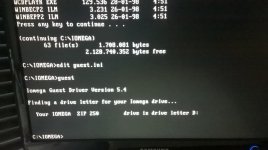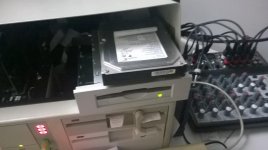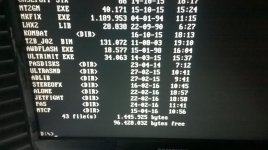Hey there fellas,
i really like to use Zip drives. I think its a decent method of moving data between an old PC and modern. ZIP media has more than enough available space to move loads of stuff around. It's specially useful when you use an XT-IDE card with an hard drive instead of a CF card.
I use a Parallel port Iomega 250 Zip drive on my 12MHz XT clone, and since my other retro machine also has a Zip drive its very convenient to help move data around. However an internal ATAPI would have a few advantages. First it would eliminate the obvious space an external drive occupies and also no need for an external power supply that also takes space. Third and most important the ATAPI drive is faster.
What we need is someone who can disassemble the Iomega ASPIATAP.SYS driver and make it so that it can talk to the XT-IDE card. I think this would be enough just to make it work via the DOS prompt when using GUEST.EXE with a V20 or PalmZIP for an 8088. Then maybe later if the XT-IDE BIOSes could support them too it would be great! Imagine booting from a ZIP drive on your vintage XT, or even using it as a poor man's hard drive. It would probably still be faster than the old MFM hard drives of the day. :D
My knowledge of assembly is non-existant however. So if anyone is interested it would be deeply appreciated. Just throwing the idea out there.
i really like to use Zip drives. I think its a decent method of moving data between an old PC and modern. ZIP media has more than enough available space to move loads of stuff around. It's specially useful when you use an XT-IDE card with an hard drive instead of a CF card.
I use a Parallel port Iomega 250 Zip drive on my 12MHz XT clone, and since my other retro machine also has a Zip drive its very convenient to help move data around. However an internal ATAPI would have a few advantages. First it would eliminate the obvious space an external drive occupies and also no need for an external power supply that also takes space. Third and most important the ATAPI drive is faster.
What we need is someone who can disassemble the Iomega ASPIATAP.SYS driver and make it so that it can talk to the XT-IDE card. I think this would be enough just to make it work via the DOS prompt when using GUEST.EXE with a V20 or PalmZIP for an 8088. Then maybe later if the XT-IDE BIOSes could support them too it would be great! Imagine booting from a ZIP drive on your vintage XT, or even using it as a poor man's hard drive. It would probably still be faster than the old MFM hard drives of the day. :D
My knowledge of assembly is non-existant however. So if anyone is interested it would be deeply appreciated. Just throwing the idea out there.




